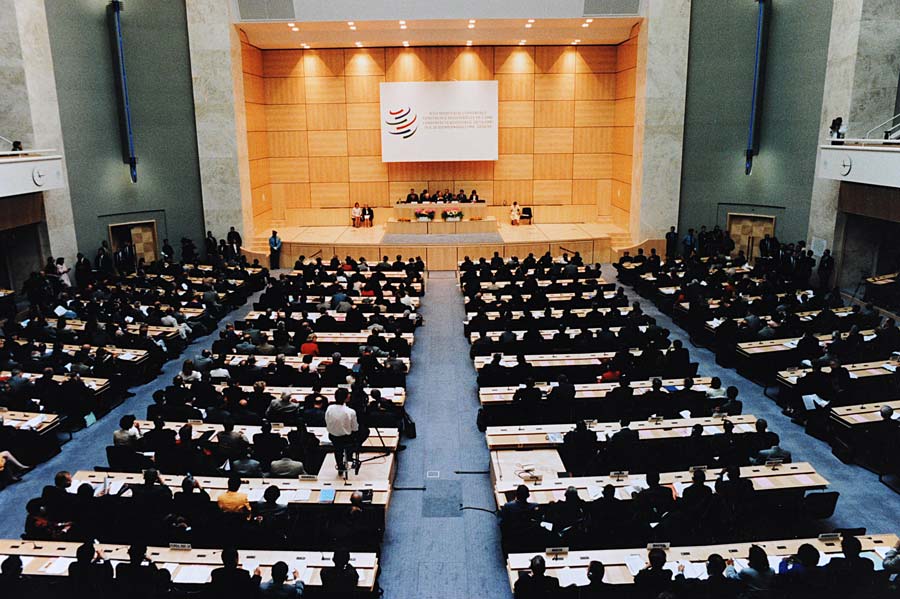The views expressed in our content reflect individual perspectives and do not represent the authoritative views of the Baha'i Faith.
For thousands of years, men have battled and killed each other over territory, fighting for their tombs.
For the past few hundred years, those battles have increased in severity, as nations began to fight with other nations over their “sovereign” lands.
The Baha’i teachings call for an end to this blight on the name of humanity:
That all nations should become one in faith and all men as brothers; that the bonds of affection and unity between the sons of men should be strengthened; that diversity of religion should cease, and differences of race be annulled—what harm is there in this? … Yet so it shall be; these fruitless strifes, these ruinous wars shall pass away, and the ‘Most Great Peace’ shall come. … Do not you in Europe need this also? Is not this that which Christ foretold? … Yet do we see your kings and rulers lavishing their treasures more freely on means for the destruction of the human race than on that which would conduce to the happiness of mankind. … These strifes and this bloodshed and discord must cease, and all men be as one kindred and one family. … Let not a man glory in this, that he loves his country; let him rather glory in this, that he loves his kind. – Baha’u’llah, quoted by J. E. Esselmont in Baha’u’llah and the New Era, pp. 39-40.
Baha’u’llah spoke these words to British orientalist Professor Edward Granville Brown in 1890, 24 years before World War I, and 51 years before World War II. Both wars were fought over land, over the domination of peoples and resources—all because rulers wanted to expand or guard their national sovereignty.
For the past 71 years, shooting wars over national sovereignty have largely diminished. Instead, we now fight “trade wars” for economic domination. Sovereign nations battle economically, rather than with bombs and guns. Of course, these non-violent wars, primarily fought through the setting of tariffs and restrictions, have also gone on for thousands of years.
The primary transnational organization actively working to ameliorate and balance competing economic desires and demands today is the World Trade Organization (WTO). It officially commenced on 1 January 1995 under the Marrakesh Agreement, signed by 123 nations. The WTO deals with regulation of trade between participating countries by providing a framework for negotiating trade agreements, and a dispute resolution process aimed at enforcing participants’ adherence to WTO agreements, all signed by representatives of member governments and ratified by their parliaments.

Meeting of World Trade Organization in Geneva
The WTO is a premier example of how peoples and nations can work out their differences through diplomacy, consultation and open discussion, a model increasingly applied to end conflicts with armaments when at all possible. Although no man-made organization will ever be perfect, words are always better than guns. Despite its unresolved problems—some of the WTO’s policies have demonstrably widened the economic gap between the world’s wealthy and poor nations, for example—its focus on trade across the entire globe has likely prevented some wars.
But this trend toward globalization threatens some people. Brexit showed the world one example of a return to national sovereignty in the face of a feeling of a loss of control of a nation’s economic well-being. Because hard-won tax revenues are increasingly more difficult to generate, Brexit is an example of a return to isolation, and hence, a false feeling of 100% control over a population’s own destiny. Of course, this kind of nationalist thinking in the age of globalization, where borders matter less and less, seems self-defeating at best.
Whether a physical armed conflict, a conflict of religious or other ideologies and “isms,” or a conflict of trade dominance—whether we want to admit it or temporarily ignore it—we are moving to a single world order and world government as the only means of reconciling competing interests on national scales. Baha’u’llah’s own words proclaimed it more than a century ago: “Soon will the present day Order be rolled up, and a new one spread out in its stead.” – Gleanings from the Writings of Baha’u’llah, p. 7.
The Guardian of the Baha’i Faith, Shoghi Effendi, described the inevitable trend this way:
The Revelation of Baha’u’llah, whose supreme mission is none other but the achievement of this organic and spiritual unity of the whole body of nations, should, if we be faithful to its implications, be regarded as signalizing through its advent the coming of age of the entire human race. It should be viewed not merely as yet another spiritual revival in the ever-changing fortunes of mankind, not only as a further stage in a chain of progressive Revelations, nor even as the culmination of one of a series of recurrent prophetic cycles, but rather as marking the last and highest stage in the stupendous evolution of man’s collective life on this planet. The emergence of a world community, the consciousness of world citizenship, the founding of a world civilization and culture… should, by their very nature, be regarded, as far as this planetary life is concerned, as the furthermost limits in the organization of human society, though man, as an individual, will, nay must indeed as a result of such a consummation, continue indefinitely to progress and develop. – The World Order of Baha’u’llah, p. 163.
The prescient phrase “the furthermost limits in the organization of human society” describes a unified global community that has progressed far past the old wars of the past, whether fought with bullets or tariffs. Given sufficient time and effort, humankind may achieve it sooner rather than later.
You May Also Like
Comments

















"Consider the flowers of a garden. Though differing in kind, color, form and shape, yet, inasmuch as they are refreshed by the waters of one spring, revived by the breath of one wind, invigorated by the rays of one sun, this diversity increaseth their charm and addeth unto their beauty. How unpleasing to the eye if all the flowers and plants, the leaves and blossoms, the fruit, the branches and the trees of that garden were all of the same shape and color! Diversity of hues, form and shape enricheth and adorneth the garden, and heighteneth the effect thereof. In like manner, when divers shades of thought, temperament and character, are brought together under the power and influence of one central agency, the beauty and glory of human perfection will be revealed and made manifest."
(The World Order of Bahá'u'lláh p41- Shoghi Effendi)
Wol Hansen - New Zealand.